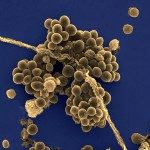Link to Pubmed [PMID] – 19262672
Nature 2009 Mar;458(7234):83-6
Antimicrobial drugs targeting the reportedly essential type II fatty acid synthesis (FASII) pathway have been recently acclaimed for their efficacy against infections caused by multiresistant Gram-positive bacteria. Our findings show that the strategy for antibiotic development based on FASII pathway targets is fundamentally flawed by the fact that exogenous fatty acids fully bypass inhibition of this pathway in both in vitro and in vivo conditions. We demonstrate that major Gram-positive pathogens-such as streptococci, pneumococci, enterococci and staphylococci-overcome drug-induced FASII pathway inhibition when supplied with exogenous fatty acids, and human serum proves to be a highly effective source of fatty acids. For opportunist pathogen Streptococcus agalactiae, growth in serum leads to an overall decrease of FASII gene expression. No antibiotic inhibitor could have a stronger effect than the inactivation of the target gene, so we challenged the role of FASII using deletion mutants. Our results unequivocally show that the FASII target enzymes are dispensable in vivo during S. agalactiae infection. The results of this study largely compromise the use of FASII-based antimicrobials for treating sepsis caused by Gram-positive pathogens.

